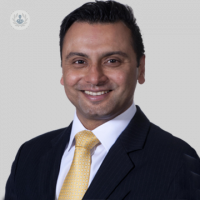Understanding acute sinusitis: Symptoms, diagnosis, and treatments explained
Written in association with:Acute sinusitis is a common condition characterised by inflammation and infection of the nose and sinuses. While it often resolves on its own, understanding the symptoms, diagnosis, and treatment options is crucial for managing the condition effectively. In his latest online article, Mr Premjit Randhawa explores the common symptoms of acute sinusitis, how it is diagnosed by ENT specialists, available treatment options, potential complications of untreated cases, and when surgery may be considered.

What are the common symptoms of acute sinusitis?
Acute sinusitis manifests through a variety of symptoms, which may include:
- Stuffy, congested, or blocked nose
- Pain and pressure or a sense of fullness around the face and eyes
- Headache
- Discoloured nasal discharge
- Fever
- Tiredness
- Toothache
Recognising these symptoms is essential for seeking timely medical attention.
How is acute sinusitis diagnosed by ENT specialists?
ENT specialists diagnose acute sinusitis based on clinical examination and the persistence of symptoms for more than 7-10 days. This examination often involves endoscopy, allowing specialists to assess the condition of the nose and sinuses. Early diagnosis is crucial for effective management.
What are the available treatment options for acute sinusitis?
Conservative measures:
- Symptoms may be self-limiting, but supportive measures can aid recovery.
- Saline nasal washes, humidification, steam inhalation, and over-the-counter nasal decongestants can provide relief.
- Adequate hydration and the use of anti-pyrectics/painkillers like paracetamol or ibuprofen can help minimise pain and fever.
Oral antibiotics:
- If symptoms persist for more than 10 days without improvement or worsen, oral antibiotics may be prescribed.
- It's important to take the prescribed antibiotics exactly as directed for the treatment to work effectively.
What are the potential complications of untreated acute sinusitis?
Untreated acute sinusitis can lead to severe complications, including:
- Spread to the eyes causing swelling, redness, and possible abscess formation.
- Infection reaching the brain, resulting in abscess/meningitis and cavernous sinus thrombosis.
- Infections breaching the bone, leading to a collection in the forehead (Pott’s Puff tumour).
- Infections breaching the skin causing redness or cellulitis. Immediate medical attention, intravenous antibiotics, and potentially surgery are required for these complications.
When should I consider undergoing surgery for acute sinusitis?
Surgery may be undertaken in cases of acute complications. However, there is no consensus on when surgery for recurrent acute sinusitis should be considered. Factors contributing to recurrent episodes, such as nasal allergy and nasal polyps, may be addressed with a trial of intranasal steroids. Structural issues, such as a deviated nasal septum, may require surgery, such as septoplasty, in conjunction with sinus surgery for long-term relief.
Mr Premjit Randhawa is an esteemed ENT surgeon. You can schedule an appointment with Mr Randhawa on his Top Doctors profile.


